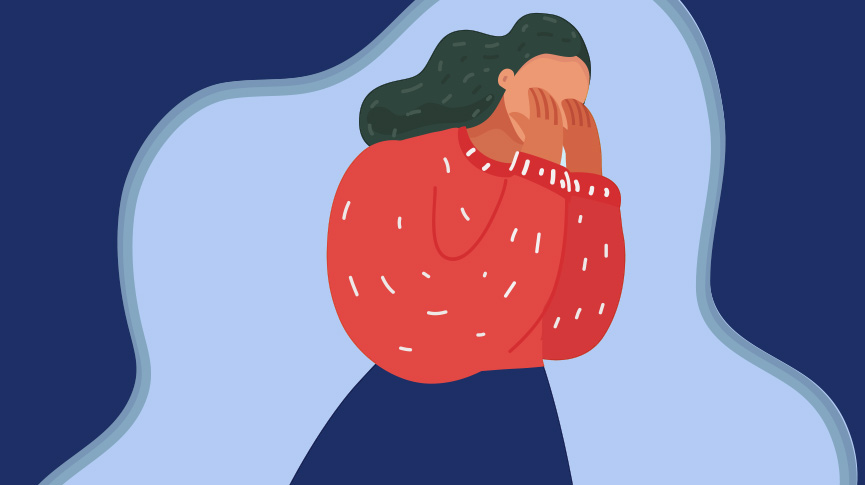Baby Blues and Postpartum Depression – Telling the Difference

Pregnancy sure is amazing; your body undergoes incredible changes, you bring a new life into the world and you have a brand new human to watch learn and grow at the end of it – sounds great right?
Unfortunately, while many of us are aware of the postpartum body changes that women experience after childbirth, there is much less understanding of the emotional side effects that can put a real dampener on life as a new mom.
The baby blues and postpartum depression are two such instances, and while the two are often confused, they have some pretty huge differences. Understanding what these conditions are, how they are caused and how to treat them properly is super important for all those new moms and moms-to-be out there.
So, what is the difference between baby blues and postpartum depression?
The Baby Blues
The ‘baby blues,’ as they are known, are caused by hormone changes after birth, namely the dramatic drop in estrogen levels. Estrogen is one of the most important hormones during pregnancy, playing a key role in the growth of your uterus, the development of your baby and ultimately preparing you for the challenges of giving birth. It is also responsible for the production of neurotransmitters such as serotonin that boost your mood and contribute to a feeling of happiness and well-being.
For a happy healthy pregnancy, estrogen is a pretty big deal!
After labor, estrogen is no longer needed in such huge quantities and so its levels plummet. The result? An emotional roller coaster of withdrawal which can lead to mood swings and a feeling of being ‘down in the dumps’.
Around 80% of new mums experience these temporary dips in mood post-pregnancy, but thankfully they usually don’t last much longer than a couple of weeks. No medical treatment is needed, however it’s important to be aware and stay in touch with how you are feeling, being sure to communicate with your loved ones if you’re finding things particularly difficult to handle.
Postpartum Depression
While the ‘baby blues’ are certainly no walk in the park, the symptoms are usually manageable and only last for a couple weeks. Postpartum depression, on the other hand, typically begins in the first few weeks after you give birth (however it can begin up to six months later) and lasts for anything between 2 months and a year.
Like the baby blues, postpartum depression is caused by hormonal changes, however, it is a much more serious condition that requires medical treatment.
Who is Affected?
Around 1 in 7 women are affected by postpartum depression. It can happen to anyone, however, it is more likely to occur in women who have experienced depression of one kind or another in the past. Still, it is unpredictable and can occur in women who have never had depression before, and even women who have given birth previously with no problems.
Postpartum depression can affect anyone, in fact, there have been several high profile cases in the media lately, with women such as Adele and Chrissy Teigen speaking out about their struggles with postpartum depression in an effort to raise awareness about the condition, so that other women are not afraid to ask for help.
What are the Symptoms?
Symptoms of postpartum depression include anxiety, fear, mania, and panic. It causes severe mood swings and sometimes even aggression. The range of symptoms are broad and varied, and you can see a comprehensive list here. Recognizing these symptoms for what they are – as frankly more serious than ‘just a bit of the baby blues’ – is crucial in dealing with postpartum depression.
What Treatment is Available?
Treatment for postpartum depression includes antidepressants, mood-stabilizing drugs and also therapy. There is no way to avoid postpartum hormonal changes, but there are things you can do to help manage the side effects, like trying to stay as stress free as possible, abstaining from alcohol and caffeine, and trying to get plenty of sleep.
The Bottom Line?
Do not be ashamed if you are finding it hard to cope with your new baby; you need to reach out to friends and family, focus on your recovery, and seek medical help if necessary. Postpartum depression is a common condition, so if you are suffering from it, know that you’re not alone.
There is lots of support available from medical professionals and online support groups. The sooner you get back on your feet, the sooner you will be able to focus on enjoying your new baby and your life as a new mother!

A collective group of “lady experts” at Intimina who love sharing our personal experiences, even when they are a little too personal. We believe it’s time to start breaking down the taboos around menstruation, motherhood, and menopause, and start owning our female health.



